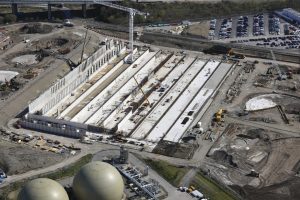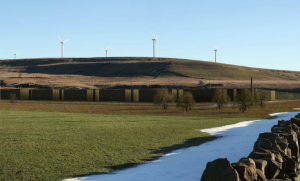University breaks ground on new energy centre to virtually end use of gas for heating

Lancaster University has broken ground on a Net Zero Energy Centre which will help to virtually eliminate the use of gas to heat its campus.
The decarbonisation milestone is situated on the outer edge of the south east Lancaster campus and will be delivered by Blackburn-based renewable energy company, Vital Energi.
The company is also delivering the multimillion-pound Mersey Heat network and Energy Centre which will reduce Liverpool’s carbon footprint and improve the energy-efficiency levels of more than 6,700 new homes, 1.3 million sq feet of commercial space, the nearby Titanic Hotel and conference spaces.
The new Lancaster University centre will house an array of air and water source heat pumps totalling seven megawatts along with a one megawatt e-boiler, generating a projected 39-Gigawatt hours (GWh) of low carbon heat, enough to heat 95% of campus buildings.
The centre will also include 1,500 cubic metres of thermal stores which will supplement the new heat supply and help ensure consistent heat during peak times of the day.
A visitor facility will also be incorporated into the design of the new energy centre. This will feature an educational meeting room for visitors from the university and other universities, local schools and community groups with an interest in sustainable energy, specifically heat pump technology.
To carry the heat across campus, 6.5km of district heating pipework is also being installed to increase the network’s coverage from approximately 65% of buildings to 95%. This will connect 247 buildings and properties to the district heat network to receive low-carbon heat and water. The project is expected to be complete in early 2027.
Lancaster University’s vice chancellor, Prof Andy Schofield, led the event on the site of the new energy centre, bringing together members of the university community including the project team, researchers, the contractor, and suppliers.
He said: “As Lancaster University continues to build on the success of its historic sustainability projects, the new Net Zero Energy Centre, expanded heat network, and solar PV farm are all crucial steps in fulfilling the university’s commitment to reducing energy-related carbon emissions from electricity and heating to net zero by 2030 and aim to be net zero from all other emissions by 2035.”
Lancaster University has been awarded more than £21m of funding from the Government’s Green Heat Network Fund (GHNF), which is being matched by the university to develop the Net Zero Energy Centre.
Scott Lutton, regional director at Vital Energi, said: “We have worked closely with Lancaster University and AECOM to engage and raise awareness of the benefits of the energy centre with the Lancaster University community, through career events, outreach, and skills development initiatives.
“Additionally, Vital Energi, the university, and AECOM have committed to creating 42 local jobs, 73 UK-wide positions, and providing 12 apprenticeships and graduate opportunities, further strengthening our ties with the wider Lancaster community.”








